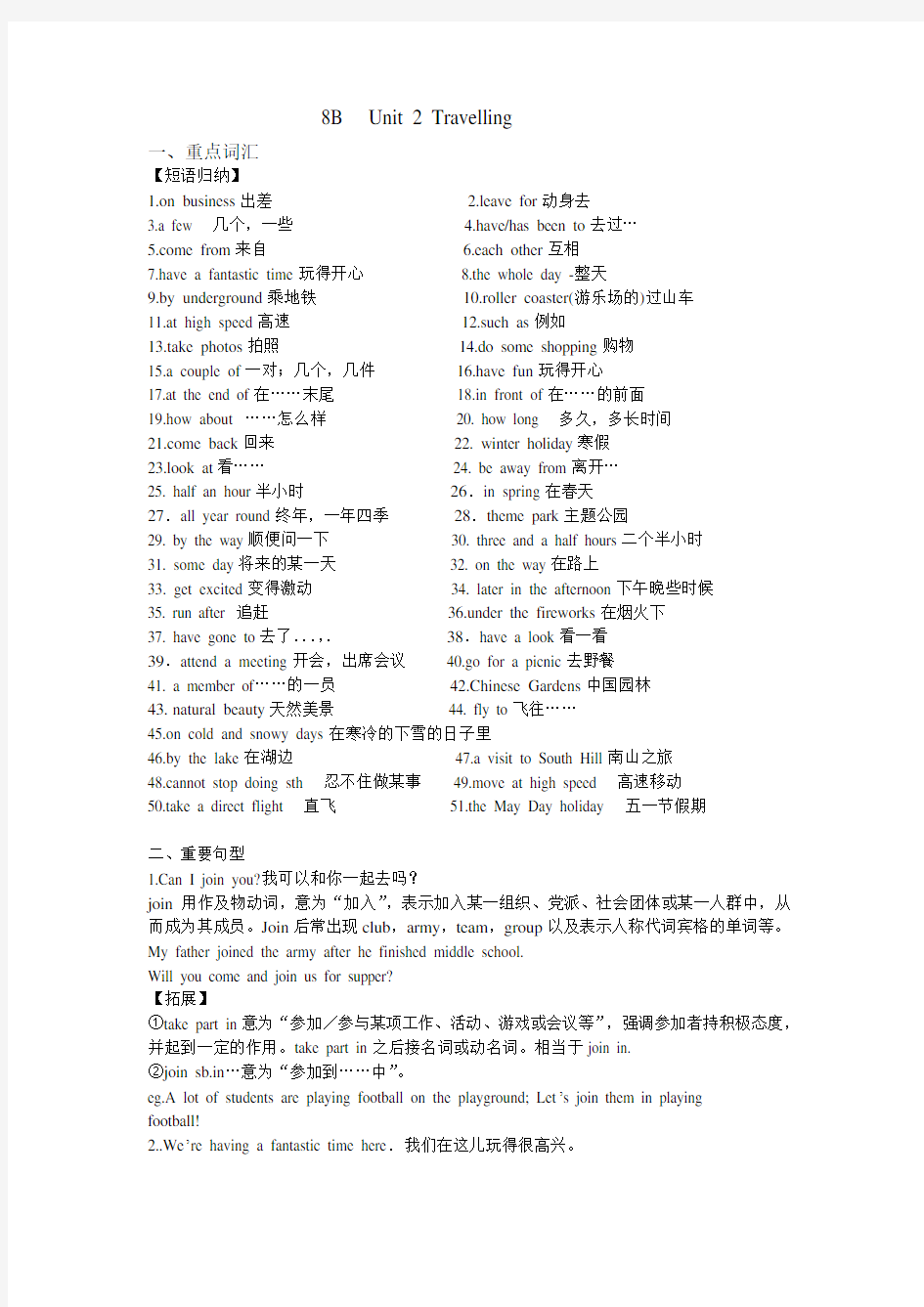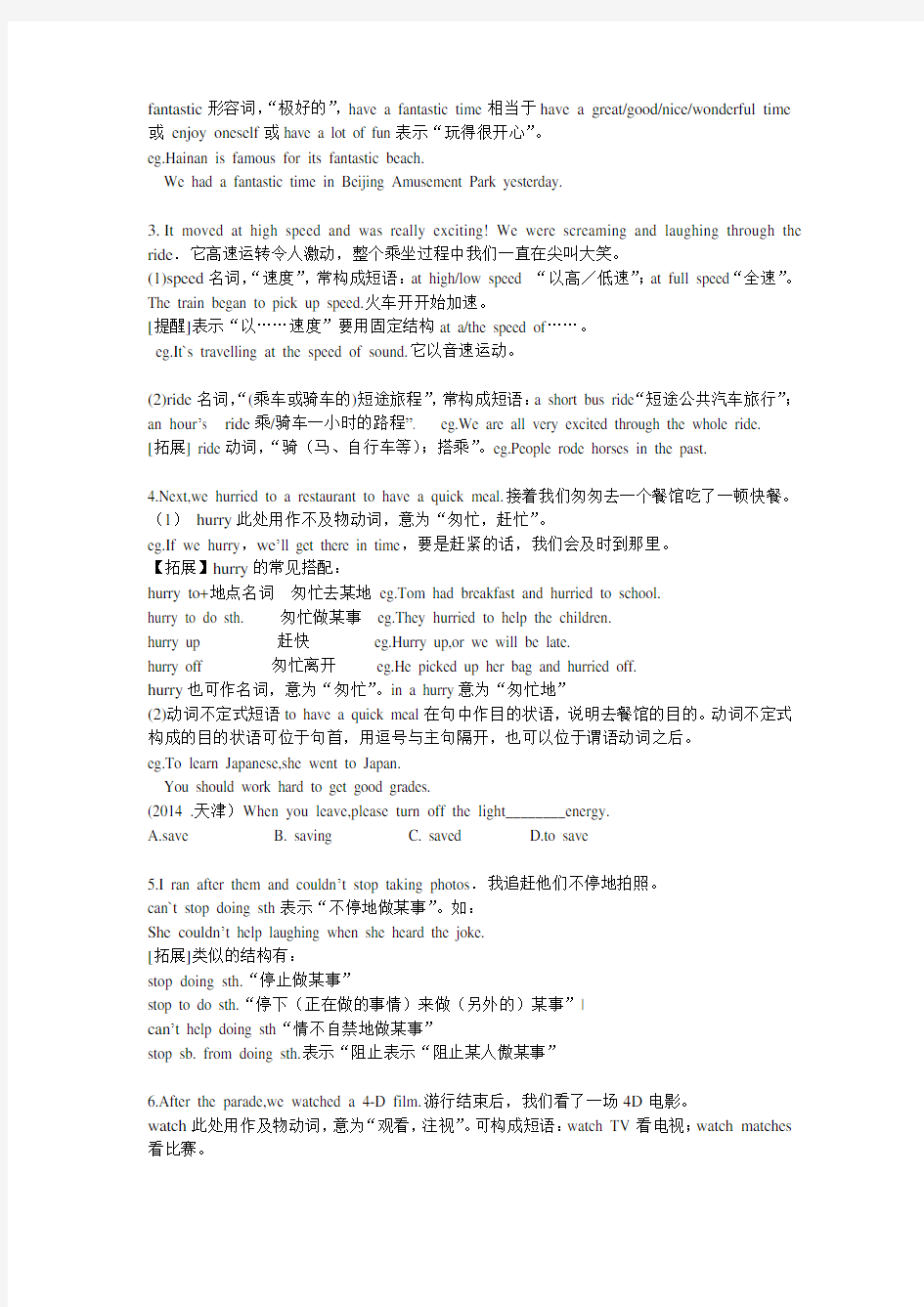译林牛津版8Bunit2知识点


8B Unit 2 Travelling
一、重点词汇
【短语归纳】
1.on business出差
2.leave for动身去
3.a few 几个,一些
4.have/has been to去过…
https://www.360docs.net/doc/9a6252596.html,e from来自
6.each other互相
7.have a fantastic time玩得开心8.the whole day -整天
9.by underground乘地铁10.roller coaster(游乐场的)过山车
11.at high speed高速12.such as例如
13.take photos拍照14.do some shopping购物
15.a couple of一对;几个,几件16.have fun玩得开心
17.at the end of在……末尾18.in front of在……的前面
19.how about ……怎么样20. how long 多久,多长时间
https://www.360docs.net/doc/9a6252596.html,e back回来22. winter holiday寒假
23.look at看……24. be away from离开…
25. half an hour半小时26.in spring在春天
27.all year round终年,一年四季28.theme park主题公园
29. by the way顺便问一下30. three and a half hours二个半小时
31. some day将来的某一天32. on the way在路上
33. get excited变得激动34. later in the afternoon下午晚些时候
35. run after 追赶36.under the fireworks在烟火下
37. have gone to去了...,.38.have a look看一看
39.attend a meeting开会,出席会议40.go for a picnic去野餐
41. a member of……的一员42.Chinese Gardens中国园林
43.natural beauty天然美景44. fly to飞往……
45.on cold and snowy days在寒冷的下雪的日子里
46.by the lake在湖边47.a visit to South Hill南山之旅
48.cannot stop doing sth 忍不住做某事49.move at high speed 高速移动
50.take a direct flight 直飞51.the May Day holiday 五一节假期
二、重要句型
1.Can I join you?我可以和你一起去吗?
join用作及物动词,意为“加入”,表示加入某一组织、党派、社会团体或某一人群中,从而成为其成员。Join后常出现club,army,team,group以及表示人称代词宾格的单词等。My father joined the army after he finished middle school.
Will you come and join us for supper?
【拓展】
①take part in意为“参加/参与某项工作、活动、游戏或会议等”,强调参加者持积极态度,并起到一定的作用。take part in之后接名词或动名词。相当于join in.
②join sb.in…意为“参加到……中”。
eg.A lot of students are playing football on the playground; Let’s join them in playing
football!
2..We’re having a fantastic time here.我们在这儿玩得很高兴。
fantastic形容词,“极好的”,have a fantastic time相当于have a great/good/nice/wonderful time 或enjoy oneself或have a lot of fun表示“玩得很开心”。
eg.Hainan is famous for its fantastic beach.
We had a fantastic time in Beijing Amusement Park yesterday.
3.It moved at high speed and was really exciting! We were screaming and laughing through the ride.它高速运转令人激动,整个乘坐过程中我们一直在尖叫大笑。
(1)speed名词,“速度”,常构成短语:at high/low speed “以高/低速”;at full speed“全速”。The train began to pick up speed.火车开开始加速。
[提醒]表示“以……速度”要用固定结构at a/the speed of……。
eg.It`s travelling at the speed of sound.它以音速运动。
(2)ride名词,“(乘车或骑车的)短途旅程”,常构成短语:a short bus ride“短途公共汽车旅行”;an hour’s ride乘/骑车一小时的路程”. eg.We are all very excited through the whole ride. [拓展] ride动词,“骑(马、自行车等);搭乘”。eg.People rode horses in the past.
4.Next,we hurried to a restaurant to have a quick meal.接着我们匆匆去一个餐馆吃了一顿快餐。(1)hurry此处用作不及物动词,意为“匆忙,赶忙”。
eg.If we hurry,we’ll get there in time,要是赶紧的话,我们会及时到那里。
【拓展】hurry的常见搭配:
hurry to+地点名词匆忙去某地eg.Tom had breakfast and hurried to school.
hurry to do sth. 匆忙做某事eg.They hurried to help the children.
hurry up 赶快eg.Hurry up,or we will be late.
hurry off 匆忙离开eg.He picked up her bag and hurried off.
hurry也可作名词,意为“匆忙”。in a hurry意为“匆忙地”
(2)动词不定式短语to have a quick meal在句中作目的状语,说明去餐馆的目的。动词不定式构成的目的状语可位于句首,用逗号与主句隔开,也可以位于谓语动词之后。
eg.To learn Japanese,she went to Japan.
You should work hard to get good grades.
(2014 .天津)When you leave,please turn off the light________energy.
A.save
B. saving
C. saved
D.to save
5.I ran after them and couldn’t stop taking photos.我追赶他们不停地拍照。
can`t stop doing sth表示“不停地做某事”。如:
She couldn’t help laughing when she heard the joke.
[拓展]类似的结构有:
stop doing sth.“停止做某事”
stop to do sth.“停下(正在做的事情)来做(另外的)某事”|
can’t help doing sth“情不自禁地做某事”
stop sb. from doing sth.表示“阻止表示“阻止某人傲某事”
6.After the parade,we watched a 4-D film.游行结束后,我们看了一场4D电影。
watch此处用作及物动词,意为“观看,注视”。可构成短语:watch TV看电视;watch matches 看比赛。
【拓展】
①watch sb. do sth.“看到某人做某事”,此时指看到某个动作发生的全过程,或看到某个经常发生的动作。
eg.I like watching my goldfish swim around in the water.
②watch sb,doing sth.“看到某人正在做某事”,此时表示看见某个动作正在进行。
eg.I watch Tom playing football on the playground.
I watched them playing basketball at that time.
7.We could even smell the apple pie and f eel the wind.我们甚至能闻到苹果馅饼的味道,并能感觉到风。
(1)smell此处用作实义动词,意为“嗅,闻,闻到”。
Can camels smell the water a mile off?骆驼能嗅出一英里外有水吗?
【拓展】
①smell名词,意为“气味;嗅觉”。
The smell made me sick.这气味让我恶心。
②smell连系动词,后面跟形容词构成系表结构,意为“闻起来…”。
The flowers smell sweet这些花闻起来很香。
(2)feel此处用作及物动词,意为”感觉到”。
Did you feel the earthquake?
I can feel something in my shoe.
【拓展】feel常用作连系动词,其主要用法有:
①表示某人的感觉,以人作主语。
I don`t feel very well today.
②表示某物摸起来给人的感觉,通常要以被摸之物作主语。
Your hand feels cold.你的手摸起来很凉。
Silk feels soft and smooth.丝绸摸起来柔软平滑。
8.I’m sure you’II love them.我确信你会喜欢它们。
sure形容词,意为“确信的;肯定的”,常见用法有:
be sure of+名词/代词, be sure +that从句意为“感到对……有把握或确信”,主语是人。be sure to do sth. “推测一定或必然会……”
eg.Take it easy. I’m sure of it.别着急,我对它有把握。
I`m sure that I can pass the exam. 我确信我能通过这次考试。
She’s sure to arrive on time. 她一定会准时到达的。
【拓展】make sure也是一个常用词组,意为“确保;查明”,后接of短语或宾语从句。They scored another goal and made sure of victory.他们又进了一个球,这就赢定了。
Make sure that they know nothing about our plan.绝对不能让他们知道我们的计划。
9.At the end of the day,we watched the fireworks in front o f Sleeping Beauty Castle.
在那一天的最后,我们在睡美人城堡前观看了烟火。
(1)at the end of意为“在…...的末尾,在……的尽头”。
There is a supermarket at the end of the road.在路的尽头有一家超市。
辨析:at the end of,by the end of与in the end
at the end of 在……的尽头/末尾,它既可指时间,也可指位置
by the end of 到……为止只表示时间概念
in the end 结果,最后只用来表示时间概念,相当于finally,其后不接of短语
(2)beauty此处用作可数名词,意为“美人,美好的东西”。还可用作不可数名词时,意为“美,美丽,漂亮”。
Don`t you think she is a beauty?难道你不认为她是个美女吗?
If I have time,I can go out to enjoy the beauty of nature.
【拓展】beautiful形容词,意为“美丽的”;beautifully副词,意为“美好地,漂亮地”。
10.Where did you go during your stay there?你们在那儿期间去了哪里?
stay此处用作可数名词,意为“逗留,停留”。一般用单数形式。
【拓展】
①stay也可作不及物动词,意为“逗留;留下”。
We stayed there for three hours.我们在那里待了3个小时。
②stay还可作连系动词,意为“保持”。相当于keep,后面接形容词作表语。
The weather stayed fine for two days.两天都是晴天。
11.What do you think was the best part of the day?你认为那天最好的是什么?
do you think在句中作插入语,意为“你认为”,它后面的部分常用陈述语序。插入语一般是对一句话作适当的附加解释,若将其去掉,对整个句子并无多大影响。若把插人语提到句子的前面,它就会成为主要部分,而原来的主要部分则成为一个从句。
你认为她什么时候会回来?
When do you think she will be back? (do you think为插入语)
Do you think when she will be back? (do you think为主句)
12.I see Andy playing on the sand too,我看见安迪也在沙滩上玩。
see sb.doing sth.意为“看见某人在做某事”,强调动作正在进行
eg.We saw some young people running wildly in the street.我们看见一些年轻人正在街上狂跑。
see sb. do sth.“看见某人做过某事”,强调动作的全过程
eg.I saw them get on the bus.我看见他们上了公共汽车。
(2014 .贵州安顺)I saw some boy students__________basketball when I passed the playground.
A. played
B. plays
C. playing
D. to play
13.He has been away from Beijing for a week. 他离开北京一周了。
be away意为“不在”,表示“离开”的状态,可以和一段时间连用,away后若有“地点”须加from,即be away from。
eg.He has been away from his hometown since 1992.
(江苏扬州中考) 一__________ did your uncle leave his home town?
---He ______________ for nearly twenty years.
A When;has left B. When; has been away
C. How long; has left
D.How long; has been away
14.The film has been on for 20 minutes.电影已经上演20分钟了。
be on意为“上演;开着”,可以表示延续状态。
eg.Are the lights in your room on?你房间的灯开着吗?
15.die死不及物动词,意为“死”。与其相关的词有:dies(第三人称单数),died (过去式),dying(现在分词),dead(形容词),death(名词)。
eg.She is dying.她快要死了。
His father died ten years ago.他的父亲十年前去世了。
辨析:die与dead
die 非延续性动词动作不延续,与时间点连用,常用于一般过去时
eg.He died 3 years ago.
dead 形容词与连系动词构成系表结构,可用于现在时态
eg.He has been dead for 3 years.
16.She can go there all year round,一年到头她都可以到那儿去。
all year round“一年到头,全年”。
eg.Some birds stay in the wetland all year round.有些鸟儿一年到头待在湿地。
【拓展】all day long“整天,一天到晚”,
You shouldn`t watch TV all day long。你不该一天到晚看电视。
17.She can go there in any season except winter. 除冬季之外,她可以在任何季节去那里。except介词,意为“除了……之外”,表示“从整体中除去……”,有“减”的意思。
eg.She goes to work every day except Sunday.除了星期天,她每天都上班。(星期天不上班)【拓展】①besides表示“除……之外,还有……”,有“加”的意思。
Besides Japanese,I can speak French.
②except for意为“除……之外”,指非同类事物间的排除,用于对前文所叙述情况的修
订和补充。
Your composition is rather good except for some spelling mistakes.
除了几个拼写错误之外,你的作文相当不错。
18.did some shopping购物
“do some+v. -ing”是习惯用法,这类结构笼统地表示“做某事”,v-ing后不能再接名词
或代词作宾语。
【拓展】do some reading读书do some writing写东西do some listening听录音do some washing洗衣服do some cooking做饭do some cleaning打扫
注意:“do some十v.—ing”在否定句或疑问句中不能将some改为any。
Went fishing by the lake去湖边钓鱼
go fishing意为“去钓鱼”,由“go+v.-ing”构成,表示“去做……”,多用于体育活动和业余活动。常见的类似短语有:
go shopping去购物go swimming去游泳go skating去滑冰go skiing去滑雪
go hiking去远足go campmg去野营go walking去散步go sightseeing去观光
19.My parents and I left for the airport in the early morning. 我和父母一大早动身去了机场。leave for意为“动身去……”,后接地点名词。Leave A for B表示“离开A地去B地
【拓展】
①leave作及物或不及物动词,意为“离开”。Miss Smith is leaving China tomorrow.
②leave用作及物动词,意为“留下”。Can I leave a message to him? 我可以给他留个口信吗?
③leave用作及物动词,意为“遗忘,把……落下”
Mum left her umbrella in the shop yesterday.昨天,妈妈把伞落在了商店.
④leave作不可数名词,意为“假,假期”。I want to ask for three days’ leave.我想请三天假。
20.It took us about three and a hal f hours to fly to Hong Kong.我们花了大约三个半小时乘飞机到香港。
three and a half hours意为“三个半小时”,也可以用three hours and a half表示。英语中
表示“……半”用“数词+and+a half+复数名词”或“数词+名词(单数或复数)+and+a+half”eg.The hall is about two and a half times the size of a room.
21.We enjoyed this trip very much,and I hope I can visit it again some day.我们非常喜欢这次旅行,我希望有一天能够再次参观它。
辨析:some day与one day
some day指“将来的某一天”,常用于将来时eg:I hope I can be a teacher some day.
one day可以表示“将来的某一天”,作此意讲时,可与some day互换;还可表示“某一天”(常用于故事的开头),常与过去时连用
eg:We want to visit the moon one day/some day.
One day,a thief was caught stealing in the shop.
三.语法专项-----非延续性动词与延续性动词
(1)非延续性动词也称为短暂性动词或瞬间动词,这类动词所表示的动作往往在“瞬间就完成了,动作不能“持续”,可以用于完成时态,但在完成时态的句子中不能与表示一段时间的状语连用,如:since two days ago,for two years等。如果要表示该动作的延续,就需要将其转换为延续性动词或表示状态的词。
常见的非延续性动词有:die,buy,borrow,lend,come,go, arrive, stop, finish, leave,open, close,begin, start, see, marry,join, hear等。
(2)延续性动词,是指动作可以持续的动词,可以跟表示持续一段时间的时间状语连用。常见的延续性动词有:keep, have, last, run, eat, drink, sing, sleep, sit, teach, live,stay等。
I have kept the book for two days.这本书我已经借了两天了?
(3)非延续性动词所表示的动作不能持续,若要跟for或slnce等表示一段时间的状语,则该非延续性动词要用延续性动词或表示状态的词来替换。
Jim left his hometown last year.吉姆去年离开了家乡。
=Jim has been away from his hometown for a year.吉姆离开家乡一年了。
常见的非延续性动词和对应的延续性动词或表示状态的词:
die→be dead join→be in/be a member of buy/catch →have
get up→be up come/arrive/go→be in/at finish/stop→be over leave→be away(from) open→be open close→be closed
begin/start→be on marry→be married borrow→keep
